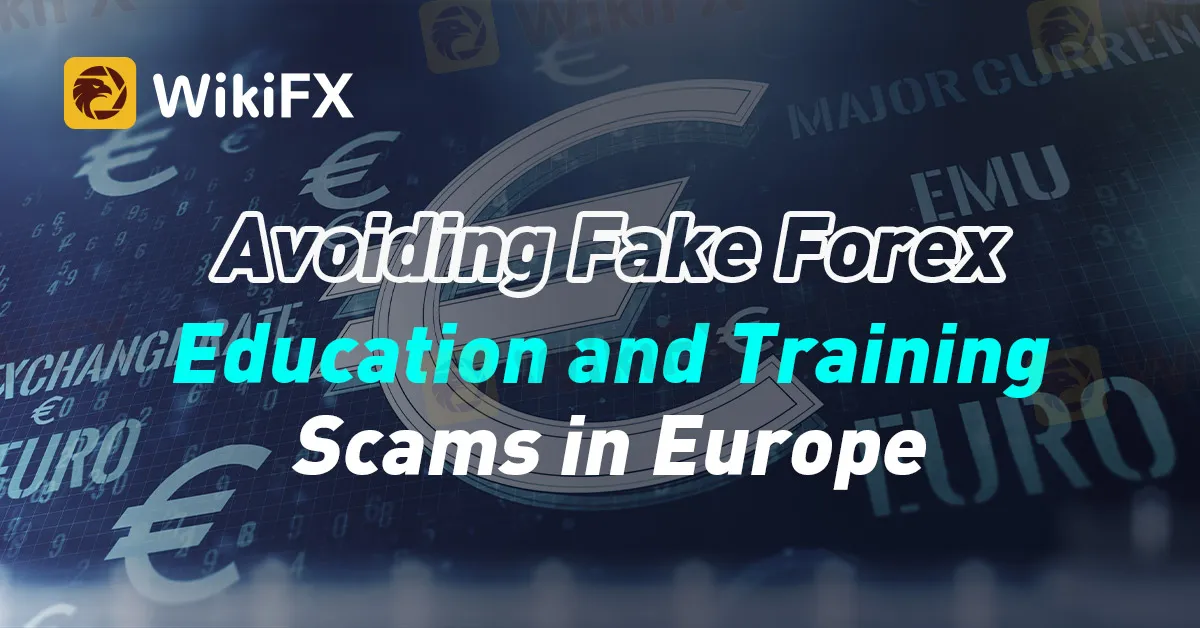简体中文
繁體中文
English
Pусский
日本語
ภาษาไทย
Tiếng Việt
Bahasa Indonesia
Español
हिन्दी
Filippiiniläinen
Français
Deutsch
Português
Türkçe
한국어
العربية
Avoiding Fake Forex Education and Training Scams in Europe
Abstract:Education and training are crucial for traders to develop their skills and succeed in the forex market. However, there are fraudulent entities that offer fake education and training programs, preying on traders' desire for knowledge. In this article, we will discuss how to recognize and avoid fake forex education and training scams in Europe.

Education and training are crucial for traders to develop their skills and succeed in the forex market. However, there are fraudulent entities that offer fake education and training programs, preying on traders' desire for knowledge. In this article, we will discuss how to recognize and avoid fake forex education and training scams in Europe.
Accreditation and Reputation
Genuine education providers often have accreditation from recognized institutions or affiliations with reputable organizations. Verify the credentials and reputation of the education provider before enrolling in any program. Look for reviews and feedback from past students.
Unrealistic Claims
Be cautious of education providers that make extravagant claims about guaranteed profits or quick success. The forex market is complex and requires time, effort, and experience to master. Legitimate providers emphasize realistic expectations and provide a comprehensive education.
Free vs. Paid
While some legitimate providers offer free educational resources, be cautious of entirely free courses that promise to make you an expert trader. Quality education often requires investment. However, research and ensure that the fees are reasonable and commensurate with the value provided.
Course Structure and Content
Evaluate the course structure and content before enrolling. Legitimate providers offer a well-structured curriculum that covers various aspects of forex trading, including risk management and technical analysis. Fake education programs may lack depth or provide outdated information.
Conclusion
Protect yourself from fake forex education and training scams by conducting thorough research, verifying accreditation and reputation, and critically evaluating the course content. For reliable information and resources on forex education, consider visiting WikiFX at www.wikifx.com. They offer comprehensive insights into education providers, helping traders make informed decisions and avoid falling victim to fraudulent schemes.

Disclaimer:
The views in this article only represent the author's personal views, and do not constitute investment advice on this platform. This platform does not guarantee the accuracy, completeness and timeliness of the information in the article, and will not be liable for any loss caused by the use of or reliance on the information in the article.
Read more

Malaysian Influencer Detained in Taiwan Over Alleged Role in Fraud Scheme
Malaysian influencer Hu Chang Mun, widely known as Ady Hu, has been detained in Taiwan for his alleged involvement in a fraudulent operation. The 31-year-old, who was reported missing earlier in December, was located by Taiwanese authorities after suspicions arose regarding his activities.

Investment Scams in Malaysia: Telegram Tops Scammers’ List
In the first 11 months of 2024, Malaysia recorded 5,685 investment scams, with Telegram emerging as the most commonly used platform for fraudulent activities.

Pros and Cons of Choosing Unregulated Forex Brokers
Discover the pros and cons of unregulated forex brokers, explore risks, benefits, and key features, and learn how to evaluate their credibility with the WikiFX app.

Gigamax Scam: Tracking Key Suspects in RM7 Million Crypto Fraud
Malaysian authorities are actively pursuing seven individuals linked to the Gigamax investment scam, which has defrauded investors of over RM7 million. The suspects include an Indonesian national, identified as Awaludin, who is believed to be the mastermind behind the scheme, and six Malaysians who served as promoters and speakers for the fraudulent operation.
WikiFX Broker
Latest News
Volkswagen agrees deal to avoid Germany plant closures
Geopolitical Events: What They Are & Their Impact?
Top 10 Trading Indicators Every Forex Trader Should Know
TradingView Launches Liquidity Analysis Tool DEX Screener
MultiBank Group Wins Big at Traders Fair Hong Kong 2024
WikiEXPO Global Expert Interview: Simone Martin—— Exploring Financial Regulation Change
'Young investors make investment decisions impulsively to keep up with current trends' FCA Reveals
Why Do You Feel Scared During Trade Execution?
CySEC Settles Compliance Case with Fxview Operator Charlgate Ltd
Malaysian Influencer Detained in Taiwan Over Alleged Role in Fraud Scheme
Currency Calculator


